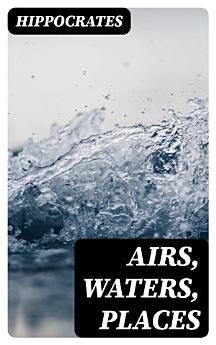Airs, Waters, Places
Hippocrates
nvb 2022 · DigiCat
E-book
23
Pages
family_home
Éligible
info
reportLes notes et avis ne sont pas vérifiés. En savoir plus
À propos de cet e-book
In "Airs, Waters, Places," Hippocrates presents a pioneering treatise on the environmental factors influencing human health, blending observational inquiry with early medical thought. The work is characterized by its empirical approach, examining how varying climates, waters, and geographies affect the health of individuals and communities. This text stands as a seminal piece in the canon of medical literature, revealing the interconnectedness of environment and well-being, while foreshadowing later developments in epidemiology and public health. Hippocrates' style is methodical and persuasive, appealing to both rational thought and empirical observation, making it a foundational text in the medical tradition. Hippocrates, known as the 'Father of Medicine,' was a pivotal figure in shifting medical practices from mystical explanations to rational theories. Living in ancient Greece around the 5th century BCE, Hippocrates was influenced by a rich intellectual tradition and the Socratic method of inquiry. His desire to understand the human body and its ailments was propelled not only by personal curiosity but also by the practical need to treat patients in a more effective manner, reflecting the ethos of his time. This compelling work is highly recommended for readers interested in the historical roots of medicine and the continuing relevance of environmental health. "Airs, Waters, Places" offers profound insights and lays the groundwork for understanding health in the context of geography and climate—concepts that are increasingly pertinent in today's world.
À propos de l'auteur
Hippocrates, often revered as the 'Father of Western Medicine,' was a seminal figure in the development of medical practice and philosophy in the classical world. Born on the Greek island of Kos around 460 BCE, he became the most celebrated physician of his time. Although direct historical records from his life are scarce, his contributions have left an indelible mark on the field of medicine. A noteworthy work attributed to Hippocrates is 'Airs, Waters, Places,' which examines environmental and lifestyle factors in relation to health and disease, proposing that one's surroundings can influence their well-being. This text is instrumental in the shift of medicine from a more superstitious practice to one predicated on observation and logical reasoning. Hippocratic thought was dominated by a belief in the natural healing process of rest, diet, exercise, and fresh air. As the reputed author of the Hippocratic Corpus, a collection of around 70 medical works of varying authenticity, his influence extends to the eponymous Hippocratic Oath, an ethical framework still in use today. Scholarly debate continues on the exact writings by Hippocrates, as many of the texts within the Corpus are considered to be the work of his followers and later interpreters who codified his teachings and practices. Despite this, Hippocrates' standing as a key historical figure in the transition to systematic and rational medical practice remains uncontested.
Donner une note à cet e-book
Dites-nous ce que vous en pensez.
Informations sur la lecture
Smartphones et tablettes
Installez l'application Google Play Livres pour Android et iPad ou iPhone. Elle se synchronise automatiquement avec votre compte et vous permet de lire des livres en ligne ou hors connexion, où que vous soyez.
Ordinateurs portables et de bureau
Vous pouvez écouter les livres audio achetés sur Google Play à l'aide du navigateur Web de votre ordinateur.
Liseuses et autres appareils
Pour lire sur des appareils e-Ink, comme les liseuses Kobo, vous devez télécharger un fichier et le transférer sur l'appareil en question. Suivez les instructions détaillées du Centre d'aide pour transférer les fichiers sur les liseuses compatibles.








